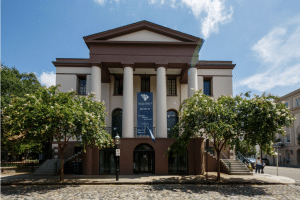News
SC Historical Society Museum Offering Free Admission Every Saturday in October
Press Release
The South Carolina Historical Society (SCHS) is proud to announce its “Fall for History” campaign, which will provide free admission to the SCHS Museum on every Saturday in October for all patrons. The exact dates for free admission are Oct. 7, 14, 21, and 28.
“We’re thrilled to invite everyone to the South Carolina Historical Society Museum on Saturdays throughout October to enjoy the museum for free,” said Faye Jensen, Ph.D., CEO of the SCHS. “Spanning six carefully-curated galleries, the SCHS Museum provides a firsthand glimpse into the lives of South Carolinians throughout history, as told from their own handwritten journals, letters, original maps, photographs and more. It’s our hope that visitors and locals alike come to explore the rich history of our state.”
Constructed in 1822 by Robert Mills, the nation’s first architect and designer of the Washington Monument, the SCHS Museum is housed in the historic Fireproof Building at 100 Meeting Street. The museum opened in 2018 and now houses six interactive galleries showcasing more than 300 years of state history. The galleries include:
Gallery One: Cultures Converge
Showcasing the early settlement years of South Carolina, this gallery features interactive kiosks examining the experiences of key figures such as Rene Ravenel, Priscilla Ball, the Cassique of Kiawah, and Eliza Lucas Pinckney. Guests can also view several original items from this period, including a 1658 Bible belonging to the Reverend Archibald Stobo.
Gallery Two: Expanding Horizons
In this gallery, visitors learn about the American Revolution and antebellum life throughout the state, including the rise of slavery, the development of urban and rural economies, and migration to the upcountry. A digital map table allows visitors a hands-on opportunity to explore South Carolina in the late eighteenth century. Other items of interest include a letter from George Washington to William Moultrie and a reproduction of Charleston’s slave auction flag.
Gallery Three: Division and Strife
Transitioning to the nineteenth century, this gallery features interactive portraits of South Carolinians from this era who come alive to share stories based on first-person accounts in the society’s collections. Scrapbooks, photographs, and hand-drawn maps are also on display.
Gallery Four: Charleston Recovers
Examining life after the earthquake of 1886, this gallery showcases items related to the natural disasters that plagued the Lowcountry in the late nineteenth century and the artistic renaissance that followed. Visitors will also enjoy a brief film discussing the emergence of historic preservation and the arts in Charleston.
Gallery Five: Celebrating Diversity
From the arts to cuisine to Gullah culture, this gallery focuses on the rise of cultural diversity throughout the state. An interactive touchscreen allows visitors to learn about various influential figures and their artistic impact alongside works by icons such as landscape architect Loutrel Briggs. There are also “discovery drawers” that feature original typescripts, photographs, and musical recordings.
Gallery Six: Africa to America
While the riches of colonial South Carolina relied upon the physical labor of enslaved Africans, those same people contributed technical knowledge, cultural depth, and an appreciation of resources that distinguished Lowcountry plantation life. This exhibit traces the origins, lifestyles, contributions, and struggles of enslaved people in Colonial South Carolina.
For more information about the SCHS Museum, please visit www.schistory.org/museum or email Brandon Reid at Brandon.Reid@schsonline.org.

























